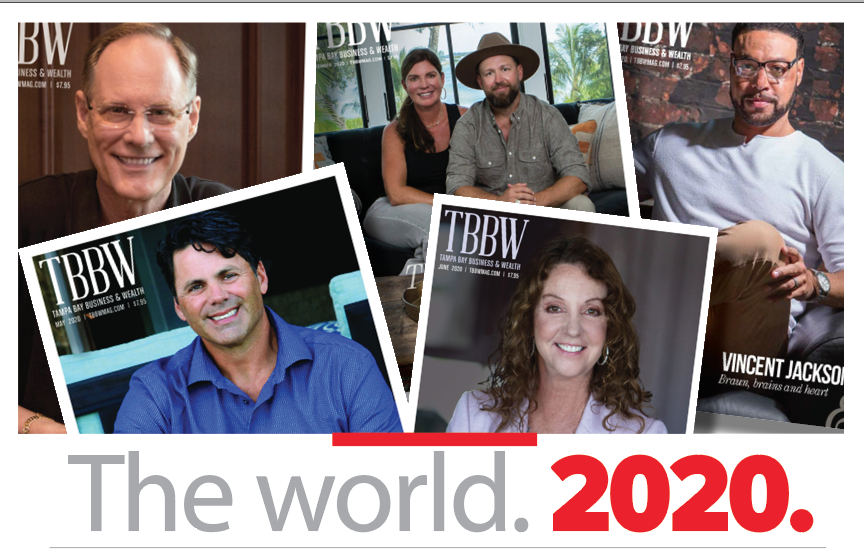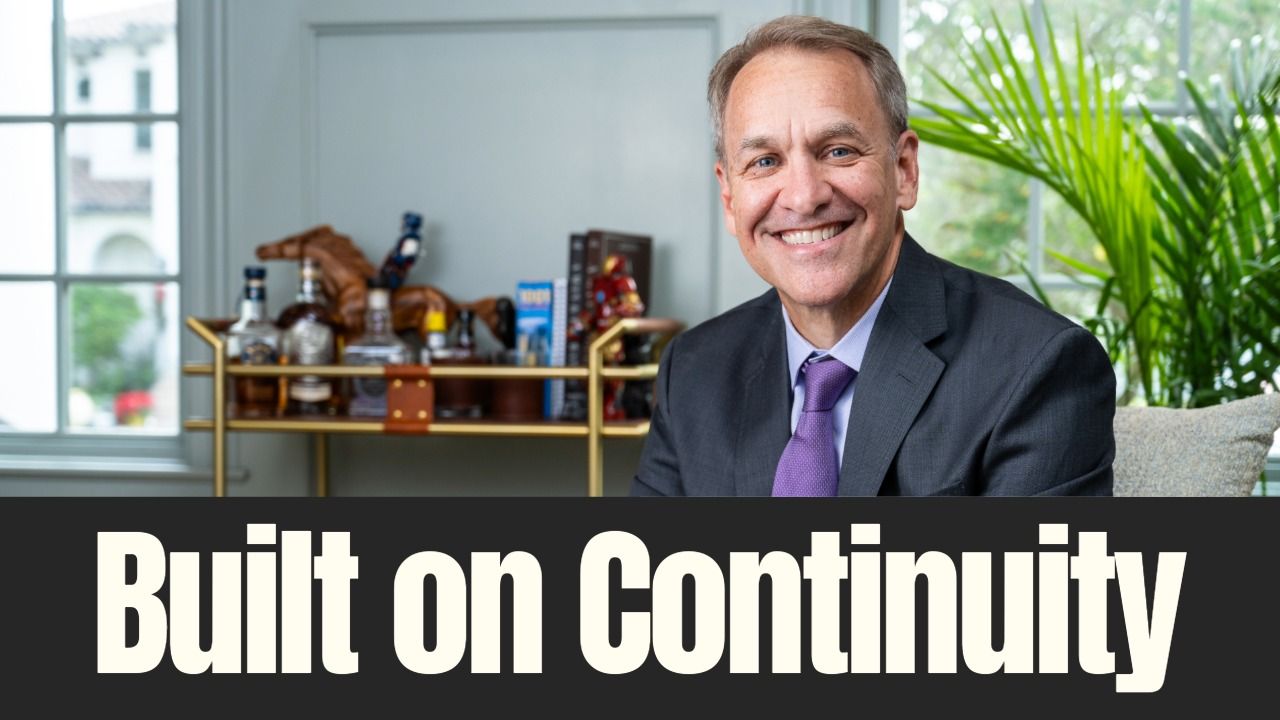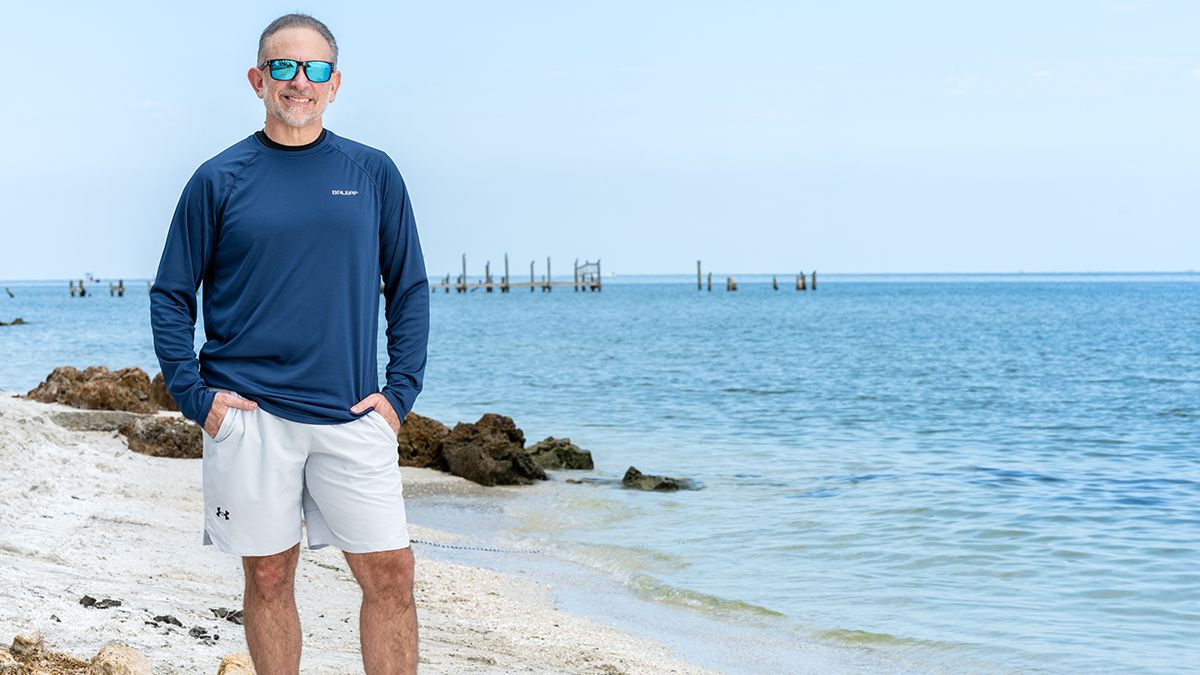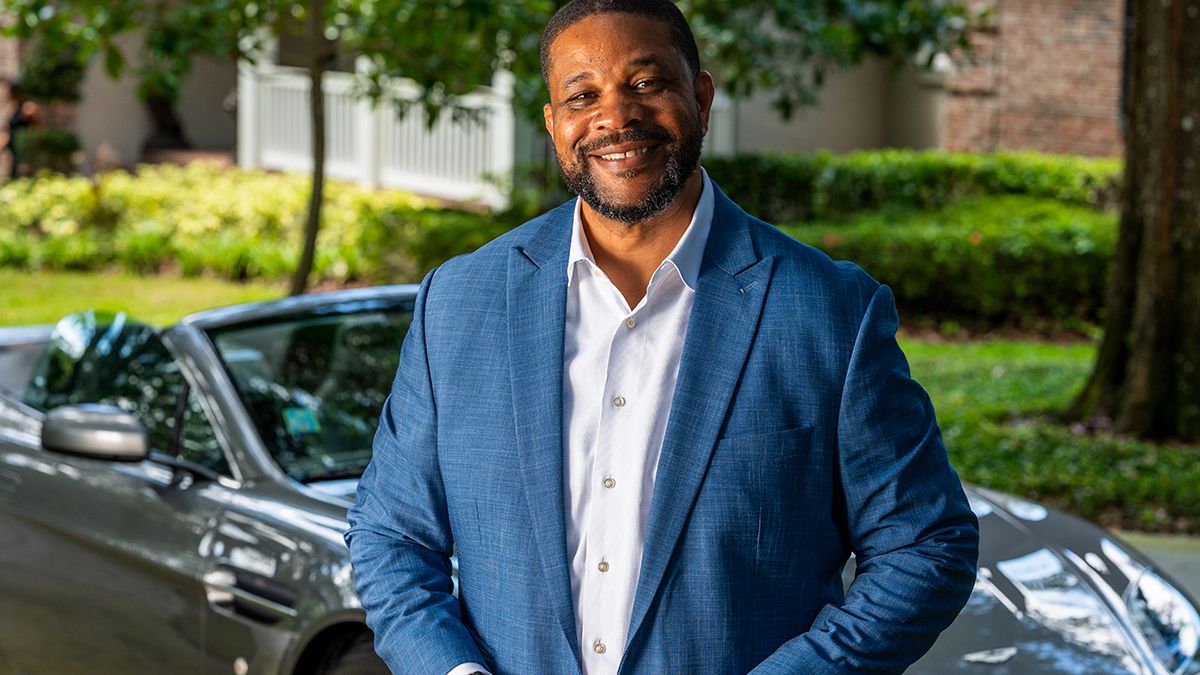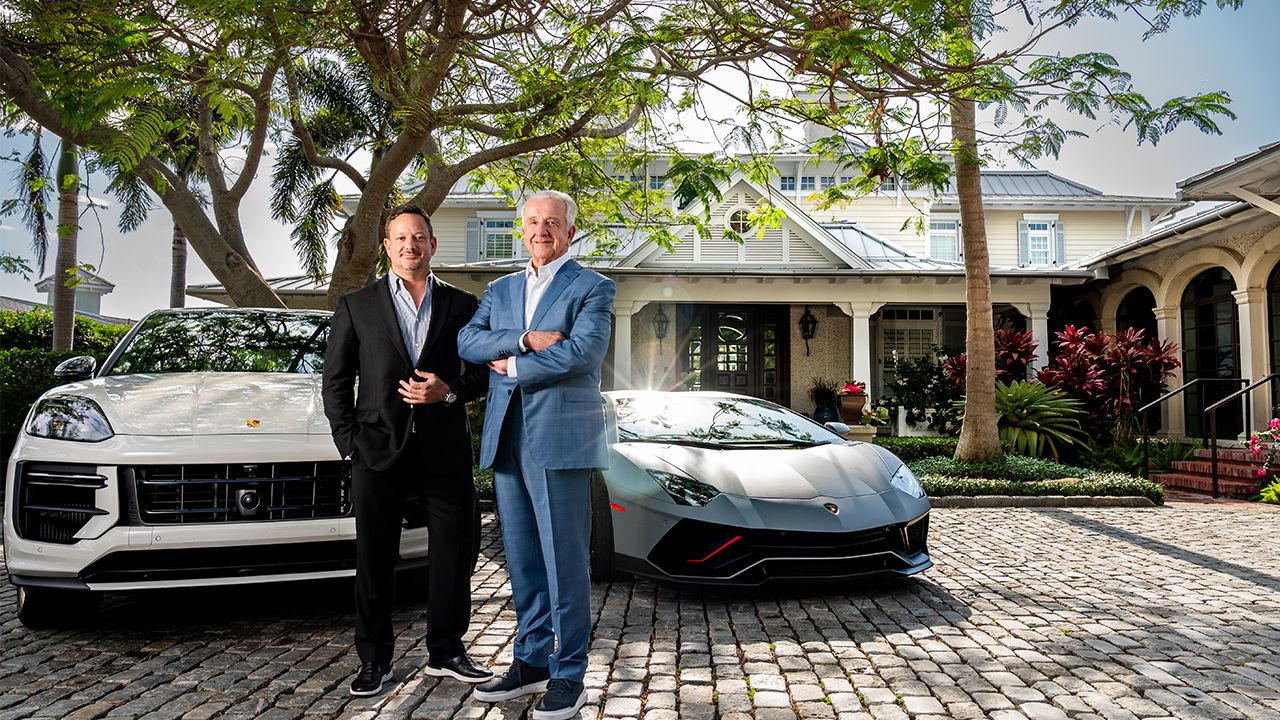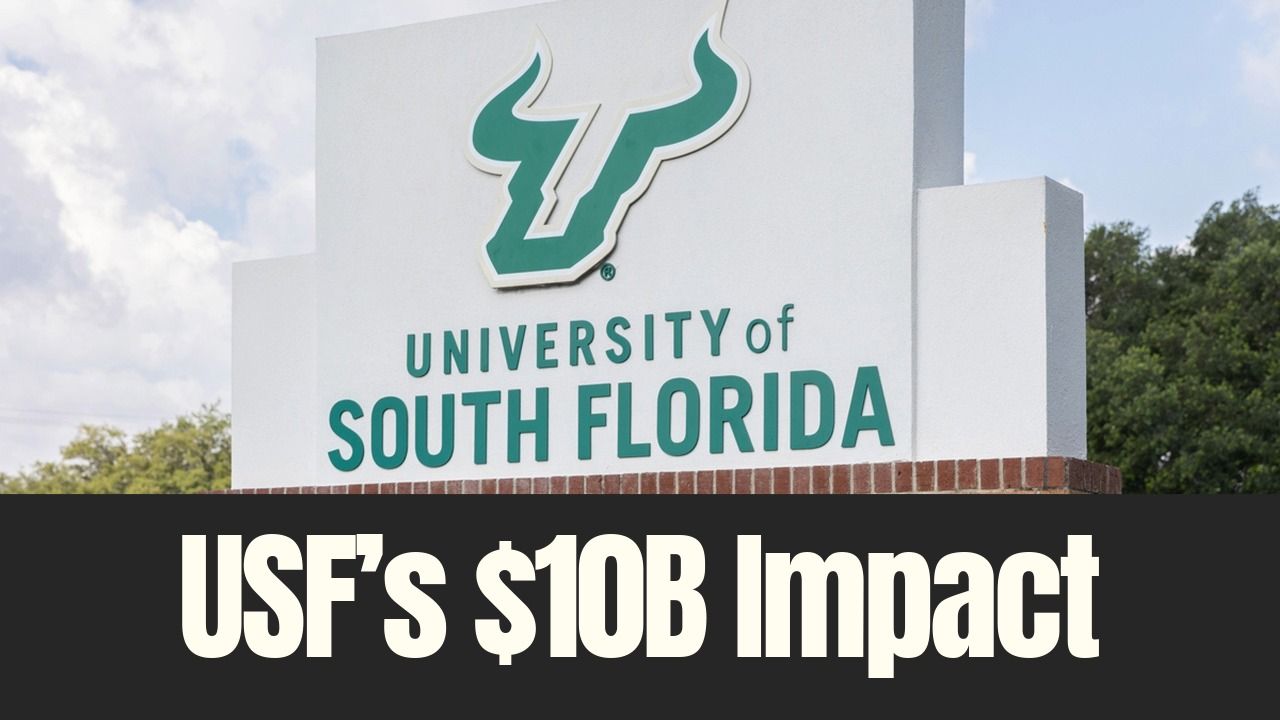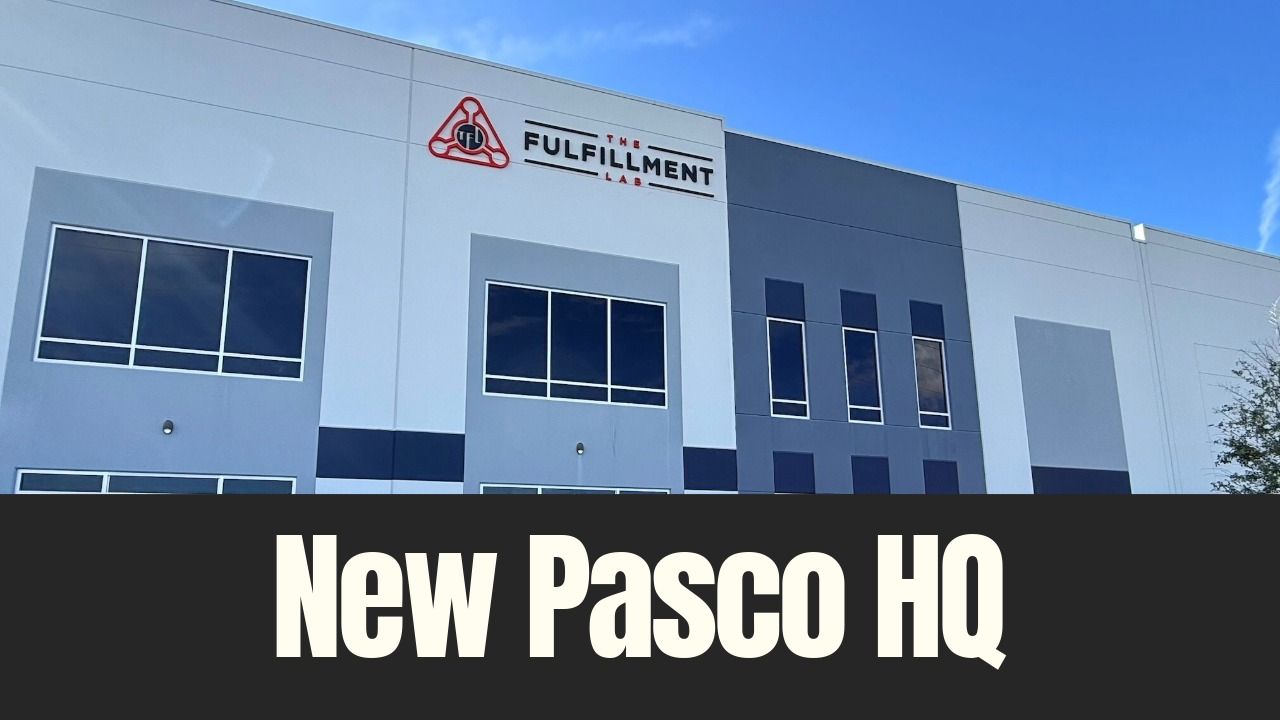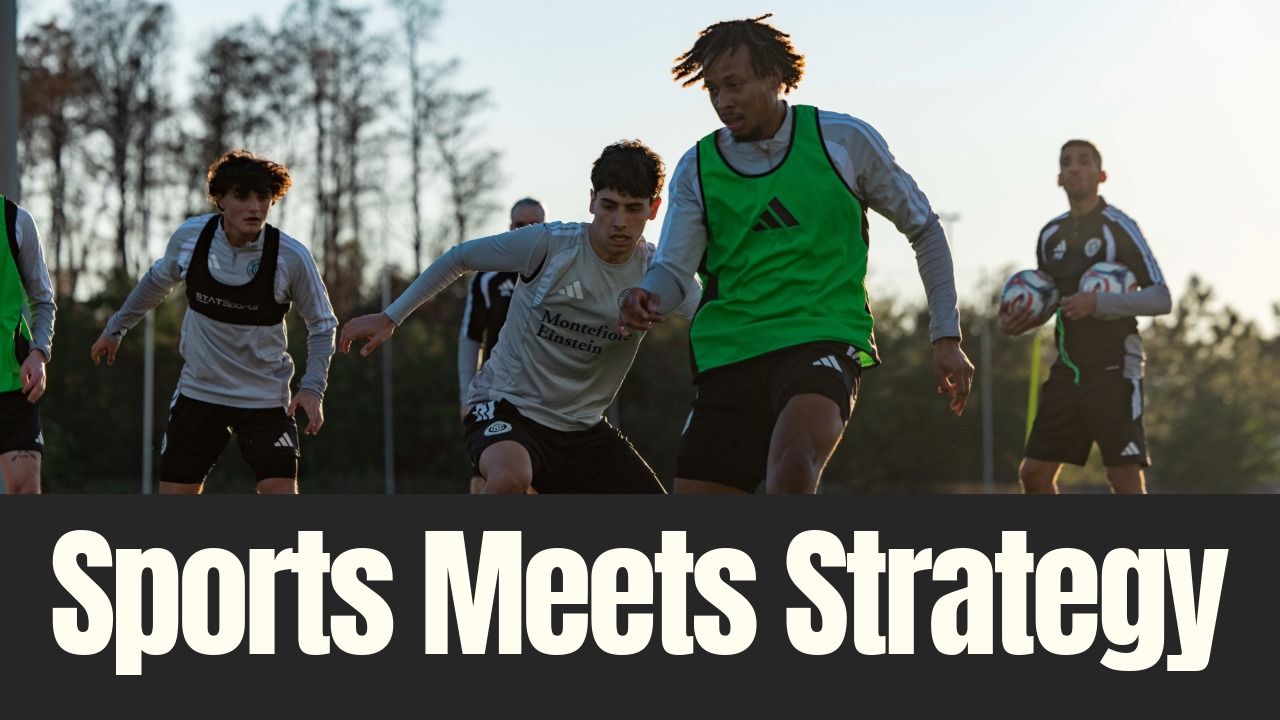If this year was a movie, it would have everything. Horror, comedy, tragedy … it would be an Oscar winner, no doubt.
Down the road, we will look back and have a different version of this experience in our heads.
But for now, it’s still fresh, not to mention ongoing.
TBBW wanted to do something different to end the year. We checked in with some of our past cover story subjects to find out what the year has been like for them, both personally and professionally.
How was their business? What lessons did they learn? Read on to find out.
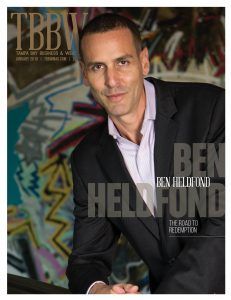
Ben Heldfond
Owner, Heldfond Holdings
Tell us the moment you realized that 2020 was about to change dramatically?
We all should have known this year was going to be different when people were killing each other over chicken sandwiches, or when Kobe Bryant was killed with his daughter, or when Prince Harry left the royal family, or when our president was impeached.
For me, those weren’t the things that made me think that this year was going to change us drastically. It was when it was clear to me that this virus was going to be politized just like every other issue in our country.
One side was saying it would disappear and what was happening in other countries wasn’t going to happen here. Then the other side was sounding the alarm bells and warning that we were going to be in trouble if we didn’t take this seriously.
At that moment it was clear to me, we were no longer the United States of America. We were going to be in big trouble and the pain was going to be here for a while.
What was your lockdown like?
It was like the movie Groundhog Day, except I was stuck in the COVID loop instead of the Punxsutawney Phil loop.
What good, and bad, came out of it?
The bad was that life as we knew it came to a screeching halt. Whatever issues I had in my life, or my personality shortcomings, got a big dumpster truck of MiracleGro sprinkled on them. The emotional, and the mental toll was tough and I didn’t handle it in the most productive or healthy way.
The good, or silver lining, for me is that it made me realize (yet again) the importance of not ignoring, or taking for granted, my physical, emotional and spiritual well being.
As a country, I hope that people have a better understanding of the struggles that people with mental illnesses have. We all probably felt lonely, sad, hopeless or scared at some point during this past year. People with mental health issues can feel that way all the time. So maybe more empathy will come out of this.
Did your business thrive or just survive?
I am not a horse investor, but rather I invest in jockeys, trainers and stables. I obviously don’t always get it right but this pandemic, more so than ever, showed me who the true jockeys were. I had some companies fold quickly, and without a fight but on the other hand, there were the ones that pivoted quickly and wouldn’t give up because of their primordial entrepreneurial spirit and they are crushing it.
What has been new in your business since we wrote about you in TBBW?
I can now, happily, say that I am a recovering venture capitalist. I have made some great investments over the years, with unbelievable multiples, however, because of the illiquid nature of those investments and companies waiting longer and longer to have an exit, it is just paper wealth. I have moved back toward investments that either have brick and mortar and/or actual profit that is distributed to owners.
What is your “looking forward” strategy for 2021?
My looking-forward strategy is to get back to my professional goal of making as much time as possible and focus more on the more important things in my life.
Will your workforce ever be 100% in the office? How does that compare, pre-pandemic?
From someone who worked from home for eight years, over time it becomes more and more difficult to stay motivated and the lack of human connection with coworkers (not through a computer screen) starts to eat away at the efficacy. I know companies are saving money on employees working from home, but from my experience, the novelty will wear off and at some point, it will end up hurting the efficiency and output of their employees and, thus, their business.
What has been the biggest lesson learned in 2020?
Pain is mandatory in life, but suffering can be optional.
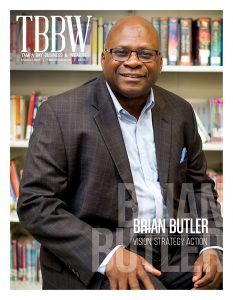
Brian Butler
President and CEO, Vistra Communications
Talk about the moment you realized that 2020 was about to change dramatically?
As the disease continued to spread internationally and I realized that our nation had not focused on the pandemic influenza implementation plan, which I helped craft in 2005 while working in The White House on the Homeland Security Council, I began to realize that we were about to face dramatic changes to our way of life.
The second major change occurred after the death of George Floyd. While we all had witnessed crimes such as that one before, somehow, I believed this one was different. In fact, my inability to sleep resulted in writing a Tampa Bay Times op-ed, which received an enormous amount of national attention. This situation resulted in my being an outspoken critic of issues pertaining to social justice and equity, especially as they affect Black and African American people in our country.
What was your lockdown like?
For the past several years I became accustomed to being on the road for more than 150 days a year. There was a direct correlation between being on the road, and building relationships, and the growth of our business.
The lockdown forced me to better, and more efficiently, use technology to stay in touch, and engaged, with not just our clients but our workforce as well. The initial phase of the lockdown was filled with fear and uncertainty. I have always believed that during times of fear and uncertainty, great leadership is required to fill the voids.
We found ways to engage our workforce more effectively and intentionally. I was focused on quickly defining a new normal that would ensure our team realized that we were all in this together and that we would get through this together while continuing to add value to our clients. Sometimes it is the things that appear to be bad that are actually quite necessary, as they may force you to make much-needed improvements.
What good, and bad, came out of it?
To borrow a phrase from my Army days, we were forced to adapt, improvise and overcome. Our team, and many of our clients, realized that we had to find ways to tweak our business models, keep people safe and keep our economy going. Many were forced to make tough decisions regarding spending time with family members and friends. We embraced technology platforms, which some had been opposed to consistently using.
Did your business thrive, or just survive?
Despite the many challenges we faced in 2020, we expect this year to be our best year since we have been in business. We started the year off with tremendous momentum from 2019, but then we hit the “pandemic wall” and, almost immediately, lost several clients and several projects. Instead of retracting, we decided to be more proactive, and more engaging and shared with others how, and why, they needed our services during the times we were facing. We launched a “V Positive” campaign, which served as a great reminder, for many, that we could not just survive during those tough times, but we could thrive as well.
What has been new in your business since we wrote about you in TBBW?
Quite a bit has changed in our business and we have continued to grow and give back to our community. We have created a practice area focused on helping companies work through tough workforce relations issues through participating in meaningful dialogue.
What is your “looking forward” strategy for 2021?
Our looking forward strategy involves accepting the facts, and conditions, of 2020 and focusing on how we use those things which we cannot change to help make us a better company and have a more meaningful impact in our community. We will continue to help companies better define their diversity strategies as they settle into a new normal.
Will your commercial real estate needs change, moving forward and, if so, how?
I do believe our commercial real estate needs have already changed. While I anticipate moving back into our office at some point soon, we certainly will not have the same focus of having everyone physically in the office full time.
Will your workforce ever be 100% in the office? How does that compare pre-pandemic?
Prior to the pandemic, the majority headquarters team was in the office full time. While we have not completely defined our workforce strategy for 2021, I anticipate that we will use some type of hybrid approach moving forward.
What has been the biggest lesson learned in 2020?
This year has been filled with lessons learned. As leaders, we must make the time to pause, reflect and listen to the songs, and whispers, of our environment. The environment in which we operate is filled with warning signs, speed bumps, brick walls and dead ends. We have an obligation to listen, learn, read and reflect to help us ensure that we know, and understand, the differences. For me, the Serenity Prayer summarizes it all; God grant me the serenity to accept the things I cannot change, courage to change the things I can and wisdom to know the difference.
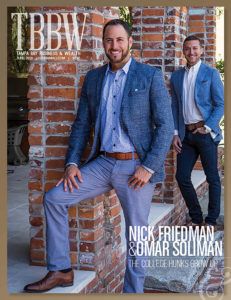
Nick Friedman
Co-founder and Owner, College Hunks Hauling Junk and Moving
Tell us the moment you realized that 2020 was about to change dramatically?
It was the middle of March. We were on pace for a record-setting year and then all of a sudden it felt like the bottom dropped out from under us. At that point, we realized it was going to be a very different year.
What was your lockdown like?
Lockdown was an opportunity to reconnect with my family. We welcomed our third daughter in June 2020. We also went full remote as a business and our teams responded very well with their productivity and teamwork.
What good, and bad, came out of it?
The best part that came from it was the camaraderie, teamwork and passion from our company. Warren Buffett says that “You see who’s been swimming naked when the tide goes out.” Because we’ve always been intentional about our culture, purpose and values, our organization stepped up and overcame the adversity despite the uncertainty.
We also started offering free moves for survivors of domestic violence as a result of the stay-at-home orders. So far, we have completed over 100 free moves for survivors.
Did your business thrive, or just survive?
As an essential business, we never shut down and after a 30% contraction in April, we bounced back significantly and now we are thriving beyond our pre-COVID expectations.
What has been new in your business since we wrote about you in TBBW?
We completed an acquisition in our Trash Butler business of our biggest competitor Well Kept and now are the second-largest provider in the country.
What is your “looking forward” strategy for 2021?
Looking forward to continue to live our purpose, as an organization, and make a positive impact in the communities we serve.
Will your commercial real estate needs change, moving forward? If so, how?
Because we are fully remote now, we are likely going to sublease a portion of our building as we don’t need the entire space.
Will your workforce ever be 100% in the office? How does that compare pre-pandemic?
No, we are going to remain a hybrid work from home and optional in the office.
What has been the biggest lesson learned in 2020?
The sun will always come out tomorrow.

Lisa Faller
President, FKQ Advertising & Marketing
What good, and bad, came out of lockdown?
Lockdown truly created a deeper appreciation for what really matters most; family, health and your most cherished personal connections. It made us all slow down (well, as much as I can anyway) examine, and re-examine, priorities and adapt, evolve and pivot—both personally and professionally.
We are glass-half-full people, beyond measure. So as strange as it may sound, albeit an interruption, the lockdown made us more grateful and instilled a greater sense of appreciation for simply everything. Even the separation from family, and our FKQ family, has made us all take a deep breath and count our bountiful blessings.
Did your business thrive, or just survive?
We are fortunate at FKQ to have an infrastructure in place that was built to withstand just about anything that may come our way. Since the onset of the pandemic we have been in the trenches with our clients, shoulder-to-shoulder, navigating every twist and turn. As a client-centric organization, we thrive on helping all the brands we serve to find a winning new path, all within an environment that no one could call business as usual.
What is your “looking forward” strategy for 2021?
FKQ will proudly celebrate 60 years in business in 2021. It’s a tremendous milestone for an independent agency in our industry. As has always been the case, we look forward to the year ahead, managing our own destiny with strategically controlled growth. We’ve stood the test of time by staying ahead of the curve and anticipating our clients’ needs. And we will continue to be unwavering in our strategy and unparalleled spirit to do “whatever it takes” for the next 60 years.
Will your commercial real estate needs change, moving forward? If so, how?
We invested, early on, to own our own real estate and to be well poised to manage and control an amazing environment for our unparalleled team. No changes anticipated.
Will your workforce ever be 100% in the office? How does that compare pre-pandemic?
FKQ’s unique culture has placed us ahead of the curve in embracing remote work status well ahead of COVID. We haven’t been 100% in-office for over a decade. Hence, the adjustments to being out-of-office during the pandemic were fairly seamless. Certainly, no one has a crystal ball on how this will all play out. But one thing’s for sure, no matter where our team is physically, we function incredibly well in generating a great product … and still having fun doing it.
What has been the biggest lesson learned in 2020?
One of the ‘life lessons’ taught by our beloved founder, Bob Faller, was to always be a financially solvent organization. Therefore, regarding the trailing eight months, we were more than prepared to carry on his legacy. Be smart. Don’t panic. And stay the course. FKQ has built tremendous equity in our long-standing relationships with tenured brands. 2020 has reinforced our philosophical approach of paying it forward (always) while remaining nimble, adaptive and embracing change.
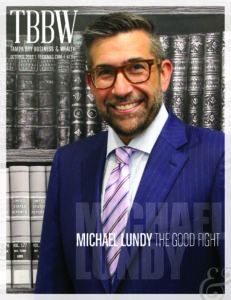
Michael Lundy
Managing and Founding Partner, Older Lundy Alvarez & Koch
Tell us the moment you realized that 2020 was about to change dramatically?
March 12, 2020. I was on a ski mountain and it was announced that the mountain was going to close permanently for the season.
What was your lockdown like?
I was in Park City, Utah. At first, it seemed simply surreal. There were so many moments of gratitude for me, for my family, for my health, for the opportunity to sequester ourselves in a comfortable situation, filled with love, and family, and for the opportunity to participate very deeply in my children’s education.
There were also so many moments of fear about the future, anxiety about the safety, or lack thereof, in the present, and concern for the ongoing suffering I knew so many people were facing in so many ways.
What good, and bad, came out of it?
The good was, I realized how strong my family is and how strong my business is. The people I work with are very special. I proved to myself that, personally and professionally, I could depend on myself and the people around me.
The bad was, we have all had to change the way we live and work, probably forever. Some of it feels cold and distant and lacking in a certain kind of humanity. I know people live in a state of elevated concern or anxiety and this takes its toll. Also, the people that work for me that are over the age of 55 have largely been even more distant and isolated and I don’t think human beings are programmed to live that way for long periods of time.
Did your business thrive, or just survive?
We’ve done a little bit of both during the last several months.
What has been new in your business since we wrote about you in TBBW?
We have continued to pursue our growth plan by merging several practices into our firm. As recently as Sept. 1, 2020, we merged KY Koch’s Clearwater office into our firm and changed our name to Older Lundy Alvarez & Koch.
What is your “looking forward” strategy for 2021?
Keep looking for the opportunities that fit our culture and pursuing a well-reasoned growth plan. Make sure my people are taking care of themselves, each other and our clients.
Will your commercial real estate needs change, moving forward? If so, how?
No, we have plenty of room in our current office to accommodate our growth and I don’t foresee any near-term material changes in our needs.
Will your workforce ever be 100% in the office? How does that compare pre-pandemic?
A hundred percent? Probably not. But it is a number that has gone from 0% to 30% and then from 30% to 50%. Presently, we are probably at 70% to 80%.
My suspicion is that when all children are back in school full time and there is an effective vaccine, we will see the number between 80% to 90%. I foresee people working remotely at least a small percentage of the time, even when this is all over.
What has been the biggest lesson learned in 2020?
Things work out best when people can focus on the greater good, instead of what is best for one or a few people. That, and real public health issues shouldn’t be politicized.
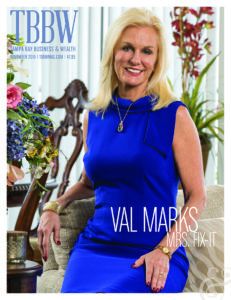
Valeri Marks
President & CEO, Medical Technology Associates
Tell us the moment you realized that 2020 was about to change dramatically?
In March when all of the news about COVID hit, I felt our world become paralyzed with indecision everywhere we turned. Our customers, who are hospitals, started turning us away while they figured out what to do. Some of our employees refused to go into the hospitals, as they weren’t sure what this COVID thing would do to them. All eyes turned to me to make decisions in a world that I had never walked in before. But out of chaos, can come opportunity.
What was your lockdown like?
It was like stepping into the twilight zone, at first. It was unchartered territory and we were all learning as we were going along. We have adjusted now but I can’t wait until the day when I can have my team back together and America gets back to “normal.”
What good, and bad, came out of it?
COVID created chaos, and uncertainty, in our business and our lives. The worst part was clearly having employees exposed to it and seeing others panicked by what it did to their family members. We had to learn to operate our culture differently as our headquarter support center was now bifurcated with remote and in-office workers. Prior to that, only field personnel were remote. This has its pros and cons. Out of the chaos, opportunities did emerge for MTA.
I saw our employees become heroes. Many really stepped up to help each other out and help the hospitals out. So many went above and beyond given that we are in the business of patient life safety. They made me so proud. We invested in computer equipment to set many of our team members up for remote work and learned how to use Teams to stay engaged. We found ways to efficiently operate with remote workers. We accelerated some technology initiatives since face-to-face meetings were not viable.
Did your business thrive, or just survive?
Overall, we have grown, but there were clearly areas where our business took a hit and other areas where we realized increased service demands.
What is your “looking forward” strategy for 2021?
Stay the course and continue to grow to meet the needs of the health care market. Continue to invest in our people and our business.
Will your commercial real estate needs change, moving forward, and if so, how?
No.
Will your workforce ever be 100% in the office? How does that compare pre-pandemic?
I haven’t decided yet. Productivity has been good but I am not ready to make that decision as the future of a “normal” America is still unclear at this point.
What has been the biggest lesson learned in 2020?
The importance of gratitude. Also, the use of different types of technology to stay connected.
When you experience a pandemic, you are hit with a large dose of reality. You learn quickly what is most important and you experience firsthand who the real heroes are. I am so grateful for the team that I have at MTA. I am grateful for the friends who were always there to support me when the days got dark with uncertainty, and stress. I am grateful for any time I get to spend with my family, near or far. And I am grateful to be inpatient life safety, where our business has meaning, which is so rewarding.
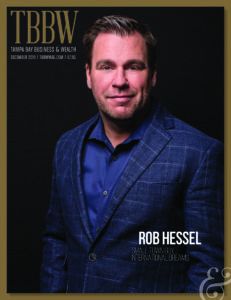
Robert Hessel
CEO & Chairman, Source 1 Solutions
Tell us the moment you realized that 2020 was about to change dramatically?
The good: It’s made us more mindful of how silly it is to come in sick, under the weather, or symptomatic, just to be present, or be seen getting the job done. We are all definitely more aware of how we really need to think less about ourselves and more about our people around us. It’s making us all second guess coming to the office with a cold because if we pass that cold on to a co-worker that has a high-risk family member at home it could compromise their immune system, making them more susceptible to Covid. Whereas before, we never really thought about that.
The challenging: Working from home is easy enough, living in a hurricane-affected area, we’re used to that and we’re prepared for that. So it’s not the “how to work from home” it’s how do you keep the same culture of an upbeat and positive office and a genuinely fun place to be? How do you translate that into the home instead of into the workplace? How do you account for things like Covid fatigue, depression, excessive drinking and all personal factors that might impact your team now and in new, and different, ways?
Did your business thrive, or just survive?
I’d say we have been able to thrive, although, as mentioned, work has not been without its challenges.
COVID has been a pivot for our customers, which means it’s been a pivot for us. And, it is not without its challenges. Covid has impacted us directly by making it very difficult for our field resources to operate from a compliance, and bandwidth, perspective. It has restricted our movements to be more compliant with local, and global, travel regulations. We have not been able to move a tech, or engineer, easily from one city to the next to cover certain geography, in some cases, because of their location of origin.
At the same time, we’re thrilled that we have been able to provide the same level of support and service that our customers have long been accustom to. And, in fact, in many cases, we are offering critical support, and services, that have truly helped them to stay operational.
Businesses aren’t just supporting one, or two, offices now, but dozens, or even more, remote home offices. Supporting WFH is an area where we have deep expertise – and we have just the talent, tools and technology that businesses need to make this transition a successful one.
What has been new in your business since we ran your story in TBBW?
The most exciting thing to happen to us this year is that we expanded to our sixth office with the opening of our 24/7/365 Global Technical Services Center. Our expanded state-of-the-art global technical services center is adjacent to our corporate headquarters. This brand-new space is now home to our elite Tier 1-3 engineers, alongside our valuable interns.
Having our GTSC within the U.S., and located in tandem with Source 1 Solutions global headquarters, gives us greater flexibility and the opportunity to add additional resources as needed while creating real synergies between support and leadership.
What is your “looking forward” strategy for 2021?
To stay focused on the business and our relationships. A core value here at Source 1 Solutions is relationships over deals. We plan to stay focused on being the best employer, partner and service provider that we can be in 2021. We expect to continue looking for talent. In fact, we’re always hiring because we don’t hire for the position, we hire for talent. In our experience, if we see great talent, we create the position. This year, during a really challenging year for the world, we still had to bring on 24 people locally and more than 100 across the globe. In 2021 if trends continue, we anticipation the need to hire as many, or more. Hiring people is something that employers were trying to avoid in these uncertain times and we were very proud to have expanded. We expect this to continue in 2021.
Will your workforce ever be 100% in the office, how does that compare to pre-pandemic?
Pre-pandemic we were an in-office company. While we’ve always had people working in different states that may be working from a home office, we were predominantly an in-office company. Post-pandemic we are still an in-office company.
I believe that there is a tremendous amount of value in togetherness. It is so important from a growth perspective: helping each other with our challenges, and frustrations, especially in a high-stress environment like ours, where fixing someone’s technology means keeping their business running. Lifting each other up after troubleshooting a critical problem just does not happen with the same effect in a dispersed work environment.
For example, if one of our techs is working on trying to fix a complex problem halfway around the world and the customer is frustrated, or irate, it can have a real impact on their mood, confidence and mental state if there’s no teammate to laugh that off with to stay positive.
Another element we never planned for going into this: COVID fatigue. Employers and managers are now frequently asking, “How is isolation and working from home affecting my team overall?” Issues like depression, alcoholism and other side effects of isolation are now regular talking points for corporations, globally.
There are too many benefits to being in-office as part of a team and the type of environment that cultivates. Companies around the world are discussing how “work from will change things forever.” While it is a great discussion, I don’t exactly think it’s true. Eventually, I anticipate leaders will migrate their teams back to the office as the COVID pandemic gets further, and further, away in our rear-view mirror.
*NOTE: Robert Hessel’s answers appear only in the digital version of TBBW’s December issue.

